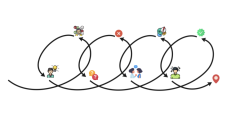During unit 2, I did four interventions.
At first, I try to help art graduates sell their works better, and I think one of the reasons people won’t buy artworks is they lack resonance. So I mainly explore the best way of combining sound and painting to help the audience have more resonance when viewing artworks.
From 1) add the sound corresponding to the picture, to 2) invite the audience to create a sound for abstract painting by themselves, to 3) apply synesthesia to create melody, to 4) use sound to convey the same emotions of the painting.
In this process, I used intervention to verify and evaluate my research question. For example, after intervention 2, I noticed no direct relationship between purchase behaviors and resonance. So then I change my goal from generating purchase behavior to shorten the distance between public and artworks.
I want to say that intervention 4 is more successful than others in some way. Because it reaches out to real audiences and the sample size is the largest, and the data shows that it works.
But recently I have been thinking about another question. For artists/art students, do they really care about whether the audience can understand their work? If I find a way to help art graduates sell their artworks better, how can I ‘sell’ it to them? Will they accept it?
In addition, selling art is not the only way to help art graduates facing employment problems, nor should it be.
Now, go back to reflect and analyze the work that I did; I find that each intervention actually corresponds to an ability that art students need to possess in employment.
Then I realized that I am finding a ‘rope’ between newly art graduates and mature, well-rounded artists. This rope is a career model to guide newly art graduates on how to plan their future careers and what kind of ability they need to have.
So, I plan to find this ‘rope’ in unit 3 through more different ways and interventions. And my newest question is: How can I find the rope between newly art graduates and mature artists to guide art student plan their careers.
